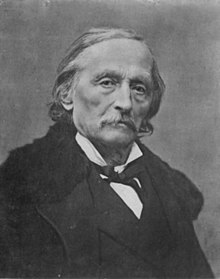Cesare Cantù
| Cesare Cantù | |
|---|---|
 |
|
| Born |
5 December 1804 Brivio, Lombardy |
| Died | 11 March 1895 (aged 90) Milan, Italy |
| Nationality | Italian |
Cesare Cantù (Italian pronunciation: [ˈtʃeːzare kanˈtu]; December 5, 1804 – March 11, 1895) was an Italian historian.
Cantù was born December 5, 1804 at Brivio, in Lombardy. He studied in Milan, at the College of St. Alexander Barnabite, and began his career as a teacher. His first literary essay (1828) was a romantic poem entitled Algiso, and in the following year he produced a Storia della città e della diocesi di Como in two volumes (Como, 1829). The death of his father then left him in charge of a large family, and he worked very hard both as a teacher and a writer to provide for them. His prodigious literary activity led to his falling under the suspicions of the Austrian police, who thought he was a member of young Italy, and he was arrested in 1833.
While in prison writing materials were denied him, but he managed to write on rags with a tooth-pick and candle smoke, and thus composed the novel Margherita Pusterla (Milan, 1838). On his release a year later, as he was interdicted from teaching, literature became his only recourse. In 1836 the Turinese publisher, Giuseppe Pomba, commissioned him to write a universal history, which his vast reading enabled him to do. In six years the work was completed in seventy-two volumes, and immediately achieved a general popularity; the publisher made a fortune out of it, and Cantù's royalties amounted, it is said, to 300,000 lire (£12,000).
Just before the revolution of 1848, being warned that he would be arrested, he fled to Turin, but after the Five Days he returned to Milan and edited a paper called La Guardia Nazionale. Between 1849 and 1850 he published his Storia degli Italiani (Turin, 1855) and many other works. In 1857 the archduke Maximilian tried to conciliate the Milanese by the promise of a constitution, and Cantù was one of the few Liberals who accepted the olive branch, and went about in company with the archduke. This act was regarded as treason and caused Cantù much annoyance in after years. He continued his literary activity after the formation of the Italian kingdom, producing volume after volume until his death. For a short time he was member of the Italian parliament; he founded the Lombard historical society, and was appointed superintendent of the Lombard archives.
...
Wikipedia
